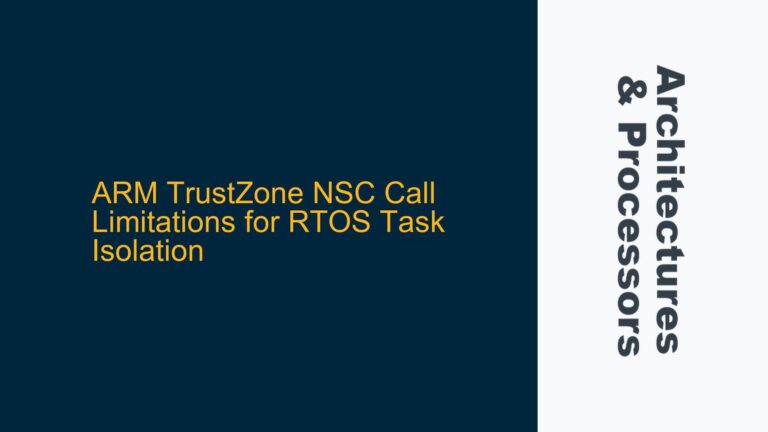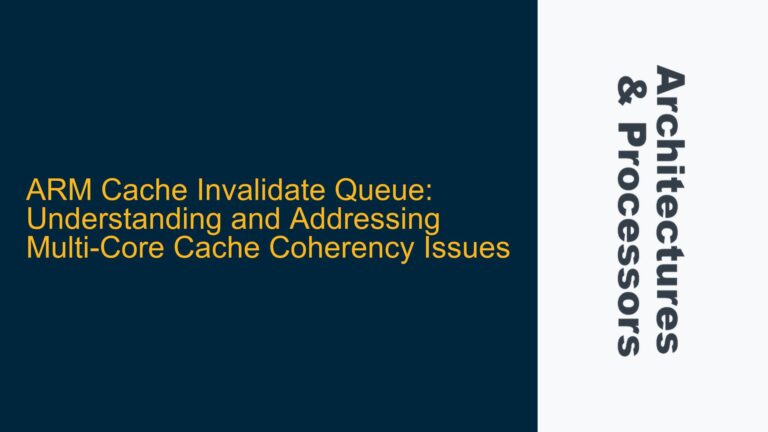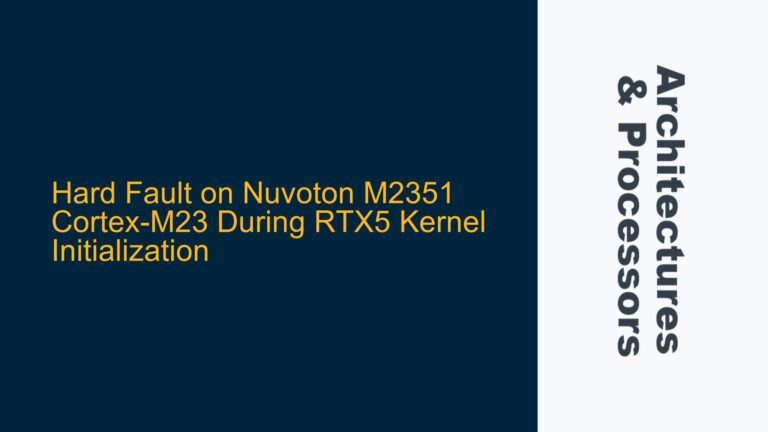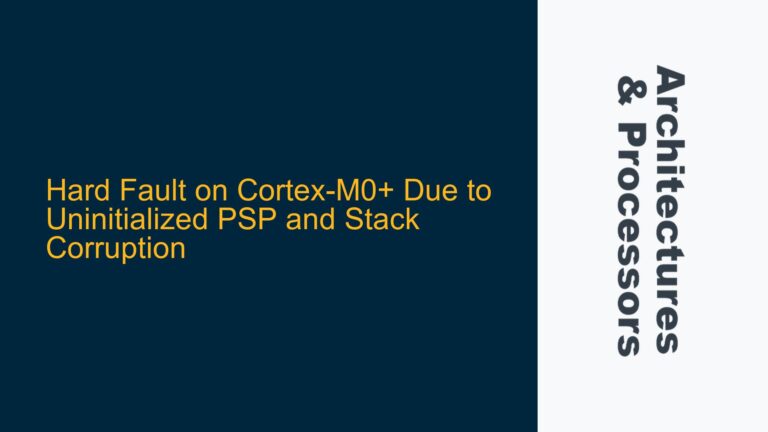ARM Cortex-M3 Global Variable Initialization Anomaly with Zero Values
The ARM Cortex-M3 microcontroller, such as the STM32F103, is a widely used processor in embedded systems due to its balance of performance and power efficiency. However, a peculiar issue has been observed where global variables initialized to zero are not being correctly set, while variables initialized to non-zero values are correctly initialized. This anomaly manifests when the code is compiled using the ARM GCC toolchain version 9.3.1 (20200408) on a Windows 7 environment. Specifically, the global variable uint32_t a = 0; is not initialized to zero, resulting in an unexpected value such as -1472002, while uint32_t b = 1; is correctly initialized to 1. This issue can lead to undefined behavior in the application, making it critical to diagnose and resolve.
The problem is particularly insidious because it involves the interaction between the compiler, linker, and the startup code responsible for initializing global variables. The ARM Cortex-M3 architecture relies on a well-defined startup sequence to initialize the .data and .bss sections of memory, which store initialized and uninitialized global variables, respectively. The .data section is typically copied from Flash to RAM during startup, while the .bss section is zero-initialized. The observed behavior suggests a failure in this initialization process, specifically for variables explicitly set to zero.
Compiler and Linker Misconfiguration in Zero-Initialized Data Handling
The root cause of this issue lies in the handling of zero-initialized global variables by the compiler and linker. When a global variable is explicitly initialized to zero, the compiler may place it in the .bss section instead of the .data section. The .bss section is intended for uninitialized variables and is typically zeroed out by the startup code. However, if the startup code fails to properly initialize the .bss section, variables in this section will contain garbage values.
The ARM GCC toolchain uses a linker script to define memory regions and section placements. The linker script specifies how the .data and .bss sections are handled during the startup sequence. If the linker script is misconfigured, or if the startup code does not correctly initialize the .bss section, zero-initialized variables may not be set to zero. This misconfiguration can occur due to several reasons:
-
Incorrect Linker Script Configuration: The linker script may not correctly define the
.bsssection or its initialization requirements. For example, the script may omit the__bss_start__and__bss_end__symbols, which are used by the startup code to identify the bounds of the.bsssection. -
Startup Code Issues: The startup code, typically written in assembly, is responsible for initializing the
.dataand.bsssections. If the startup code does not correctly zero out the.bsssection, zero-initialized variables will not be properly initialized. This can happen if the startup code is not updated to match the linker script or if there are errors in the assembly code. -
Compiler Optimization Flags: Certain compiler optimization flags may affect how global variables are handled. For example, aggressive optimization flags may cause the compiler to place zero-initialized variables in the
.bsssection, assuming that the startup code will handle the initialization. If the startup code does not perform this initialization correctly, the variables will contain garbage values. -
Toolchain Version Incompatibilities: The issue may be specific to the ARM GCC toolchain version 9.3.1 (20200408). Different versions of the toolchain may handle global variable initialization differently, and this version may have a bug or incompatibility that affects zero-initialized variables.
Diagnosing and Resolving Zero-Initialization Failures in ARM Cortex-M3
To diagnose and resolve the zero-initialization issue, a systematic approach is required. The following steps outline the process for identifying and fixing the problem:
Step 1: Verify the Linker Script Configuration
The first step is to verify that the linker script correctly defines the .bss section and its initialization requirements. The linker script should include the following definitions for the .bss section:
.bss :
{
__bss_start__ = .;
*(.bss*)
*(COMMON)
__bss_end__ = .;
} > RAM
These symbols (__bss_start__ and __bss_end__) are used by the startup code to identify the bounds of the .bss section. If these symbols are missing or incorrectly defined, the startup code will not be able to properly zero out the .bss section.
Step 2: Inspect the Startup Code
The startup code is responsible for initializing the .data and .bss sections. The following assembly code snippet shows how the .bss section should be zeroed out:
ldr r0, =__bss_start__
ldr r1, =__bss_end__
mov r2, #0
bss_zero_loop:
cmp r0, r1
it lt
strlt r2, [r0], #4
blt bss_zero_loop
This code loads the start and end addresses of the .bss section into registers r0 and r1, respectively. It then uses a loop to zero out the memory between these addresses. If this code is missing or incorrect, the .bss section will not be properly initialized.
Step 3: Check Compiler Optimization Flags
Compiler optimization flags can affect how global variables are handled. Ensure that the compiler flags are not causing zero-initialized variables to be placed in the .bss section without proper initialization. The following flags should be reviewed:
-O0: Disables optimization, ensuring that variables are placed in the correct sections.-fno-common: Prevents the compiler from placing uninitialized global variables in the COMMON section, which may not be zeroed out by the startup code.
Step 4: Update the Toolchain
If the issue persists, consider updating the ARM GCC toolchain to a newer version. The issue may be specific to version 9.3.1 (20200408), and a newer version may have fixed the bug or incompatibility. The ARM GCC toolchain is regularly updated, and newer versions may include improvements and bug fixes related to global variable initialization.
Step 5: Implement a Workaround
If the issue cannot be resolved through the above steps, a workaround can be implemented. One approach is to explicitly initialize the global variables in the main() function, ensuring that they are set to the correct values before they are used. For example:
uint32_t a;
uint32_t b;
int main(void) {
a = 0;
b = 1;
printf("%d %d", a, b);
return 0;
}
This approach ensures that the variables are correctly initialized, regardless of any issues with the startup code or linker script.
Step 6: Validate the Fix
After implementing the fix, validate that the global variables are correctly initialized. This can be done by running the application and verifying the output. Additionally, inspect the memory contents using a debugger to ensure that the .bss section is properly zeroed out.
Step 7: Document the Solution
Finally, document the solution to ensure that the issue does not recur in future projects. Include details about the linker script configuration, startup code, compiler flags, and any workarounds that were implemented. This documentation will be valuable for other developers working on similar projects.
Conclusion
The ARM Cortex-M3 global variable initialization issue with zero values is a complex problem that involves the interaction between the compiler, linker, and startup code. By systematically diagnosing and resolving the issue, it is possible to ensure that global variables are correctly initialized, preventing undefined behavior in the application. The steps outlined in this guide provide a comprehensive approach to identifying and fixing the problem, ensuring reliable operation of the embedded system.






